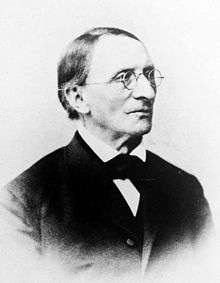
Carl Ludwig Blume
Charles Ludwig de Blume or Karl Ludwig von Blume (9 June 1796, Braunschweig – 3 February 1862, Leiden) was a German-Dutch botanist.
He was born at Braunschweig in Germany, but studied at Leiden University and spent his professional life working in the Dutch East Indies and in the Netherlands, where he was Director of the Rijksherbarium (state herbarium) at Leiden. His name is sometimes given in the Dutch language form Karel Lodewijk Blume, but the original Germanic spelling is the one most widely used in botanical texts, but even then there is confusion as he is sometimes referred to as K.L. (from Karl).
He carried out extensive studies of the flora of southern Asia, particularly in Java, then a colony of the Netherlands. From 1823 to 1826 Blume was Deputy Director of Agriculture at the botanic garden in Bogor (Buitenzorg) in Java. In 1827 he became correspondent of the Royal Institute of the Netherlands. In 1855, he was elected a foreign member of the Royal Swedish Academy of Sciences.

Carl Ludwig
Carl Friedrich Wilhelm Ludwig (German: [ˈluːtvɪç]; 29 December 1816 – 23 April 1895) was a German physician and physiologist.
In 1842 Ludwig became a professor of physiology and in 1846 of comparative anatomy. From professorships in Zurich and Vienna he went in 1865 to the University of Leipzig and developed there the Physiological Institute, designated today after him: Carl Ludwig Institute of Physiology. Ludwig researched several topics such as the physiology of blood pressure, urinary excretion, and anesthesia. He received the Copley Medal in 1884 for his research. In 1869, he was elected a foreign member of the Royal Swedish Academy of Sciences. He is credited for inventing the stromuhr.
Since 1932 the Carl Ludwig Honorary Medal is awarded by the German Society for Cardiology to outstanding investigators in the area of cardiovascular research.
Life
Ludwig was born at Witzenhausen, near Kassel, and studied medicine at Erlangen and Marburg, taking his doctor's degree at Marburg in 1839. He made Marburg his home for the next ten years, studying and teaching anatomy and physiology, first as prosector to FL Fick (1841), then as privat-docent (1842), and finally as extraordinary professor (1846). In 1849 he was chosen professor of anatomy and physiology at Zurich, and 6 years afterwards he went to Vienna as professor in the Josephinum school for military surgeons.
Carl Ludwig (Medal of Honor)
Carl Ludwig was a Private in the Union Army, received the Medal of Honor, on July 30, 1896, for his brave and gallant action at the Second Battle of Petersburg, Virginia during the American Civil War.
Medal of Honor citation
Citation:
See also
References
External links
Podcasts:

